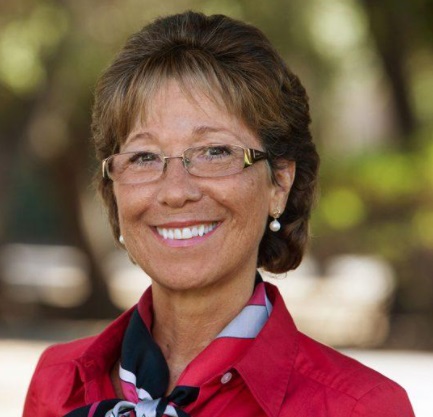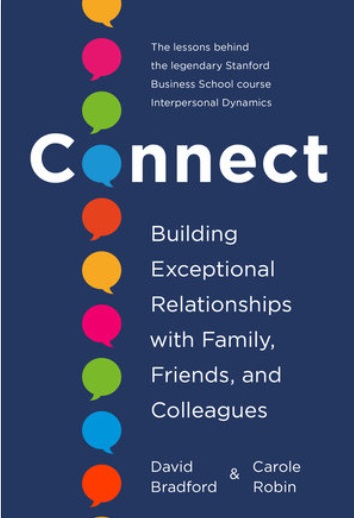Limpert Tech "SullyCast" on ALT 105.7 and iHeartRadio 6/12/21 - Carole Robin, Stanford Professor, Author
 Wednesday, June 16, 2021 at 10:38AM
Wednesday, June 16, 2021 at 10:38AM Students say Stanford’s most popular course, Interpersonal Dynamics, is worth the tuition in and of itself.
Want to find out for yourself?
Stanford Professor, Carole Robin joins Rick this week to talk about her new book!

Connect by David Bradford, Ph.D. and Carole Robin, Ph.D. They have a combined 45 years, Professors Carole Robin, Ph.D. and David Bradford, Ph.D. taught how to break through superficial interactions, get real and create meaningful connections with people in every aspect of life.
Now Robin and Bradford are letting the masses audit their class with their new book, CONNECT: Building Exceptional Relationships with Family, Friends, & Colleagues (Penguin Random House’s Currency; February 2021).
Have a listen to the interview:
Filled with real-life situations, the book is a framework that covers all the intricacies of relating to someone, from expectations to conflict. There are simple things we all can do for any connection we want to strengthen and anytime you move from casual contact to something that’s more meaningful, you enrich your life, such as:
Take Disclosure Risks
When you don’t know where to start, begin with sharing something about yourself. This builds trust. It’s doesn’t have to be major. A small but meaningful fact, especially if it includes a feeling, will suffice, e.g.:
· You could say, I’m moving to San Francisco.
· Or you could offer a little more and say, I’m moving to San Francisco, and I’m excited but really anxious. I have had many moments of wondering if this is the right decision.
The latter feels riskier. But as your comfort to share gets bigger, the other person is likely to reciprocate.
Ask Encouraging Questions
After disclosing, ask the person something about them. But remember: Not all questions are equal. Robin and Bradford encourage open-ended questions rather than ones that elicit a yes or no response. This helps to generate new options and perspectives. (They also advise avoiding ‘why’ questions, as those cause people to feel they need to justify themselves.)
Remember You Only Know Your Reality
No matter how well you think you know a person, or how perceptive you may be, you still don’t know what’s going on with someone else. The biggest mistake people do is think they know what is going on in the other person’s reality. Understanding this and remaining naïve when it comes to building connection will encourage more genuine curiosity.
Stay on Your Side of the “Net”
In any interaction between two people, there are three realities: Reality one is what’s going on inside of you Your intent and motives). Reality two is both of your behaviors (the only reality known to both people.) Reality three is how our behaviors impact someone else. Too often we blur the lines between assumption and reality, and we assume we know what the other person is thinking of feeling. (This particularly happens during times of disagreement.) Robin calls this “jumping the net.” If you start to impute motives, label me, or say that you know what’s going on for me, then you’re playing in my court. Instead, stay on your side of the net and stick to facts. Give behaviorally specific feedback. And offer clear examples of how the person’s actions impacted you (avoiding “you” statements), e.g.:
· Rather than saying: You never hear me… (outside your reality and on their side of the net)
· Try saying: When I talk to you when you enter the door and you don’t respond, I don’t feel heard. And when I don’t feel heard, it makes me less open to being there for you in the ways I want to be…
The latter option invites a problem-solving conversation rather than making the person feel defensive.
Honor Emotions
Robin believes we’ve been socialized to leave emotions out of tough conversations, both at work and in our personal lives. We’ve stigmatized feelings. The truth is, feelings give value and meaning to things, she says, which is why it’s important to normalize them and bring them back into our everyday communication with each other.
Be You
Don’t put on an act. Really. Be. You. This will generate more openness and cause others to do the same. Robin says “It was so freeing to discover that if I allowed myself to be more known, and I didn’t spin my image, people actually liked me more. They were more drawn to me and I was so much more influential.”
Know that You Have Agency—and Deeper Connections Are Possible
It may seem daunting, or even impossible. But deep, fulfilling connections are possible—even with a wider range of people than we may expect. We’re all works in progress. Some people need to not take so much oxygen out of the air. Some people need to make more space for others. Some need to learn how to step up and take more space so they don’t have to wait for a break in conversation. You can decide what you most need in order to be more effective and to connect better.
Carole was the Dorothy J. King Lecturer in Leadership and Director of the Arbuckle Leadership Fellows Program at Stanford Graduate School of Business before co-founding Leaders in Tech, which brings the principles and process of “Touchy Feely” to executives in Silicon Valley. Prior to coming to Stanford, she had careers in sales and marketing management and was a partner in two consulting firms. She lives in Palo Alto, California, with her husband of 35 years.
 Carole Robin,
Carole Robin,  Connect,
Connect,  Stanford,
Stanford,  book in
book in  ALT 105.7,
ALT 105.7,  Google,
Google,  radio,
radio,  tech segment
tech segment
Reader Comments